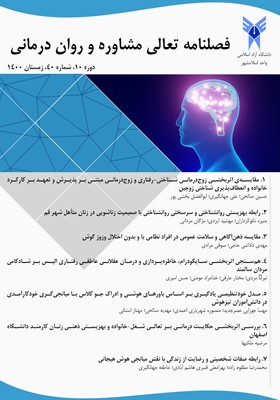مقایسه ذهنآگاهی و سلامت عمومی در افراد نظامی با و بدون اختلال وزوز گوش
محورهای موضوعی : فصلنامه تعالی مشاوره و روان درمانیمهدی داداشی حاجی 1 , صوفی مرادی 2 *
1 - دانشجوی دکتری، گروه روانشناسی بالینی، دانشگاه علوم پزشکی شهید بهشتی، تهران، ایران
2 - استادیار، گروه علوم اجتماعی، دانشکده مدیریت دانشگاه افسری امام علی (ع)، تهران، ایران.
کلید واژه: سلامت عمومی, ذهنآگاهی, اختلال وزوز گوش, افراد نظامی,
چکیده مقاله :
هدف: اختلال وزوز گوش در افراد نظامی شایع است و به همین دلیل پژوهش حاضر با هدف مقایسه ذهنآگاهی و سلامت عمومی در افراد نظامی با و بدون اختلال وزوز گوش انجام شد. روش: این پژوهش از نظر هدف کاربردی و از نظر شیوه اجرا علی- مقایسهای بود. جامعه پژوهش نظامیان مرد مراجعهکننده به بیمارستان خانواده ارتش و دانشجویان دانشگاه افسری امام علی (ع) در سالهای 1400-1399 بودند. حجم نمونه 50 نفر در نظر گرفته شد که با روش نمونهگیری در دسترس انتخاب و در دو گروه مساوی (25 نفر با اختلال وزوز گوش و 25 بدون آن) جایگزین شدند. گروهها به پرسشنامههای ذهنآگاهی (بائر و همکاران، 2006) و سلامت عمومی (گلدبرگ و هیلیر، 1979) پاسخ دادند و دادهها با روشهای خیدو و تی مستقل در نرمافزار SPSS-21 تحلیل شدند. یافتهها: یافتهها نشان داد که گروهها از نظر متغیرهای جمعیتشناختی تأهل و سن تفاوت معناداری نداشتند (05/0P>). گروهها از نظر نمره کل ذهنآگاهی و مولفههای مشاهده، توصیف و عمل با آگاهی تفاوت معناداری داشتند (05/0˂P)، اما از نظر مولفههای عدم قضاوتگری و عدم واکنشگری تفاوت معناداری نداشتند (05/0P>). همچنین، گروهها از نظر نمره کل سلامت عمومی و مولفههای علائم جسمانی، افسردگی و بدکارکردی اجتماعی تفاوت معناداری داشتند (05/0˂P)، اما از نظر مولفه اضطراب و بیخوابی تفاوت معناداری نداشتند (05/0P>). نتیجهگیری: نتایج حاکی از وضعیت نامناسبتر نظامیان با اختلال وزوز گوش در مقایسه با نظامیان بدون آن از نظر ذهنآگاهی و سلامت عمومی بود. بنابراین، برنامهریزی برای بهبود ویژگیهای روانشناختی آنها جهت استفاده از روشهای درمانی مناسب ضروری است.
Purpose: Tinnitus disorder is common in the military personnel and therefore the present study was conducted with the aim of comparison the mindfulness and general health in military personnel with and without tinnitus disorder. Methodology: This research in terms of purpose was applied and in terms of implementation method was causal-comparative. The research population was the male military who referred to the Army Family Hospital and students of Imam Ali Military University in 2020-2021 years. The sample size was considered 50 people who were selected by available sampling method and were replaced into two equal groups (25 people with tinnitus and 25 people without it). The groups answered to the questionnaires of mindfulness (Baer et al, 2006) and general health (Goldberg and Hillier, 1979) and the data were analyzed by methods of chi=square and independent t-test in SPSS-21 software. Findings: The results showed that the groups did not have significant difference in terms of demographic variables of marriage and age (P>0.05). The groups have significant difference in terms of the total score of mindfulness and components of observation, description and action with awareness (P˂0.05), but did not have significant difference in terms of the components of non-judging and non-reactivity (P>0.05). Also, the groups have significant difference in terms of the total score of general health and components of somatic symptoms, depression and social dysfunction (P˂0.05), but did not have significant difference in terms of anxiety and insomnia component (P>0.05). Conclusion: The results showed that the military with tinnitus were in a worse condition than the military without it in terms of mindfulness and general health. Therefore, planning to improve their psychological characteristics is necessary to use appropriate treatment methods.
_||_

